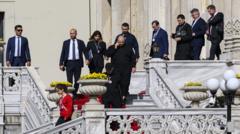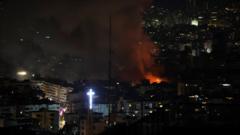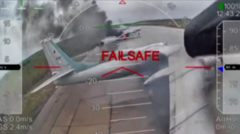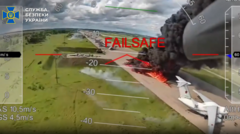In a recent round of peace talks held in Istanbul, both nations reaffirmed their deep divisions over the conflict that has persisted since February 2022, with no consensus on a ceasefire arrangement.
Ceasefire Talks Break Down Again as Russia and Ukraine Agree to Prisoner Exchange

Ceasefire Talks Break Down Again as Russia and Ukraine Agree to Prisoner Exchange
Despite ongoing negotiations, Russia and Ukraine fail to reach a ceasefire agreement, settling instead for a prisoner swap.
In a renewed effort to negotiate peace, representatives from Russia and Ukraine met once again in Istanbul, yet the discussions culminated once more without an agreement on a ceasefire. The central point of contention remains Ukraine's demand for an "unconditional ceasefire," which Russia has consistently rebuffed. Instead, the two countries settled on a prisoner swap agreement, under which they will exchange sick and critically injured prisoners of war, with plans also in place to return the bodies of 12,000 fallen soldiers.
Following over an hour of talks, Ukrainian negotiators underscored their insistence on a comprehensive ceasefire that would last at least 30 days, urging for an end to the violence that has ravaged their nation. In stark contrast, the Russian delegation proposed a temporary truce primarily aimed at recovering deceased soldiers, reflecting the ongoing rift in priorities.
Ukraine's Defense Minister, Rustem Umerov, expressed frustration over Russia's lack of a formal response to their ceasefire proposals, noting that Moscow presented its own plan only during the talks. President Volodymyr Zelensky criticized Russia's approach on social media, emphasizing that any ceasefire should prioritize the cessation of deaths.
Russian state media later published details of Moscow's demands, which include Ukraine's withdrawal from territories currently under Russian control. Key components of Russia's stance involve maintaining the annexation of Crimea and limiting Ukraine's military capabilities. Despite claims of progress through the prisoner exchange, officials from both sides anticipate a prolonged and complicated process, particularly in light of Russia's refusal to relent on its tough conditions.
Ukrainian authorities also raised concerns about the forced relocation of children to Russia, suggesting that the humanitarian aspect remains an unresolved issue. As the conflict continues unabated, President Zelensky has called for heightened sanctions against Russia, reflecting the urgent need for international support.
Further complicating the situation, U.S. President Donald Trump has voiced his willingness to mediate talks but has faced criticism for delaying actions that could impose stricter sanctions on Russia. The geopolitical landscape surrounding the conflict remains precarious as global leaders grapple with the implications of ongoing hostilities.
This round of negotiations mirrors earlier discussions held in May, which too concluded without fruitful resolutions. As both nations gear up for potential future discussions, the path to lasting peace appears increasingly fraught with challenges.
Following over an hour of talks, Ukrainian negotiators underscored their insistence on a comprehensive ceasefire that would last at least 30 days, urging for an end to the violence that has ravaged their nation. In stark contrast, the Russian delegation proposed a temporary truce primarily aimed at recovering deceased soldiers, reflecting the ongoing rift in priorities.
Ukraine's Defense Minister, Rustem Umerov, expressed frustration over Russia's lack of a formal response to their ceasefire proposals, noting that Moscow presented its own plan only during the talks. President Volodymyr Zelensky criticized Russia's approach on social media, emphasizing that any ceasefire should prioritize the cessation of deaths.
Russian state media later published details of Moscow's demands, which include Ukraine's withdrawal from territories currently under Russian control. Key components of Russia's stance involve maintaining the annexation of Crimea and limiting Ukraine's military capabilities. Despite claims of progress through the prisoner exchange, officials from both sides anticipate a prolonged and complicated process, particularly in light of Russia's refusal to relent on its tough conditions.
Ukrainian authorities also raised concerns about the forced relocation of children to Russia, suggesting that the humanitarian aspect remains an unresolved issue. As the conflict continues unabated, President Zelensky has called for heightened sanctions against Russia, reflecting the urgent need for international support.
Further complicating the situation, U.S. President Donald Trump has voiced his willingness to mediate talks but has faced criticism for delaying actions that could impose stricter sanctions on Russia. The geopolitical landscape surrounding the conflict remains precarious as global leaders grapple with the implications of ongoing hostilities.
This round of negotiations mirrors earlier discussions held in May, which too concluded without fruitful resolutions. As both nations gear up for potential future discussions, the path to lasting peace appears increasingly fraught with challenges.






















